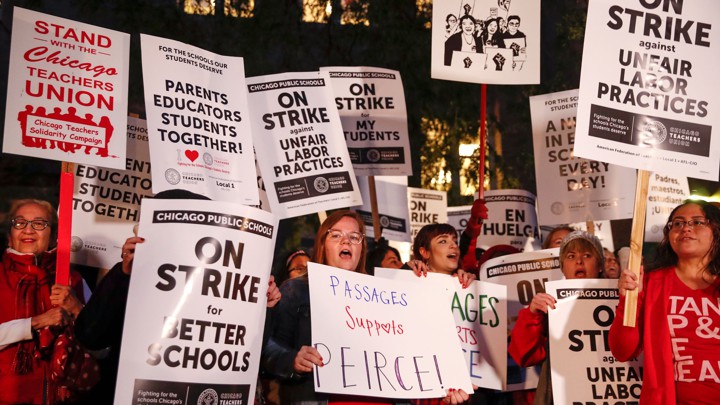As the Strike Approached in Chicago, Teachers Taught Labor
“I asked the kids, ‘Do you want to know what we’re fighting about?’” said one teacher. They did.

CPS and Chicago’s mayor, Lori Lightfoot, had publicly questioned why the union was fighting so hard for a raise, and at Kelly, Lane heard comments from students that the potential strike was just about money. “As a teacher, you know, that’s going to make you want to address the issue,” said Lane, who is a member of the CTU’s Latino caucus. “So I asked the kids, ‘Do you want to know what we’re fighting about?’” They were interested, so in a day and a half, Lane put together a lesson plan that covered the history of the modern labor movement, including 40-hour workweeks and child-labor laws. Shortly afterward, the CTU voted to authorize a strike the following month, the second time it has done so in the past decade (the first was a far-reaching week-long action in 2012).
The current strike is now in its eighth day of negotiations, and encompasses both the CTU and the Service Employees International Union 73, which represents the classroom aides, custodians, and other workers who keep the city’s school system—serving some 361,000 students—running. Those two unions together represent about 35,000 workers, tens of thousands of whom have been picketing this week outside their schools and flooding Chicago’s downtown center. The CTU is arguing for higher pay to keep up with Chicago’s mounting cost of living, alongside a long list of other requests, including smaller class sizes, more school nurses and librarians, funding for bilingual education, and access to affordable housing for teachers and their students, an estimated 16,450 of whom are homeless.
The city contends that the teachers are asking for more than the city can afford, and Lane says she printed out and used some of CPS management’s emails as CONTINUE READING: How Chicago's Teachers Explained the Strike to Students - The Atlantic

